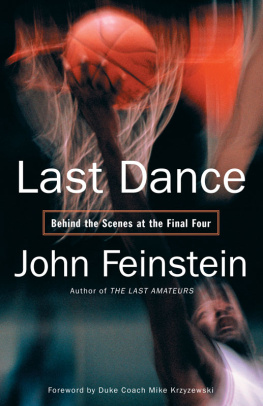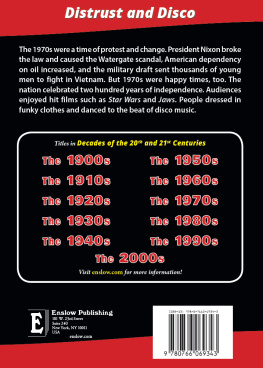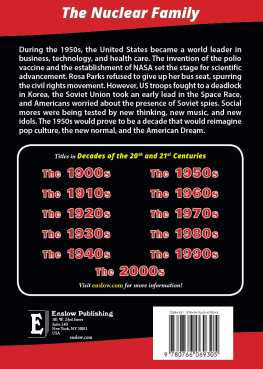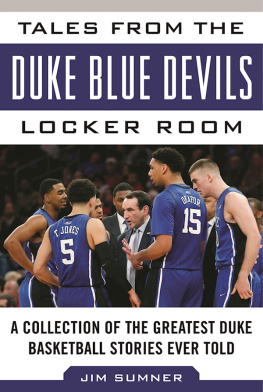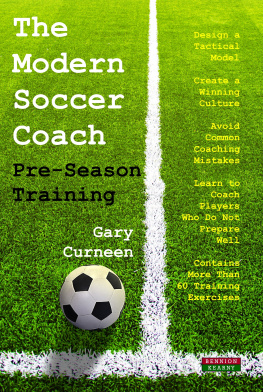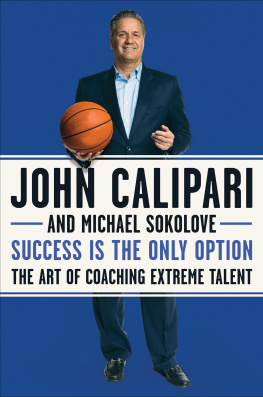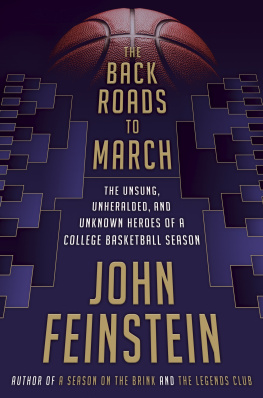Feinstein - Forevers Team
Here you can read online Feinstein - Forevers Team full text of the book (entire story) in english for free. Download pdf and epub, get meaning, cover and reviews about this ebook. year: 2011, publisher: Random House Publishing Group, genre: Detective and thriller. Description of the work, (preface) as well as reviews are available. Best literature library LitArk.com created for fans of good reading and offers a wide selection of genres:
Romance novel
Science fiction
Adventure
Detective
Science
History
Home and family
Prose
Art
Politics
Computer
Non-fiction
Religion
Business
Children
Humor
Choose a favorite category and find really read worthwhile books. Enjoy immersion in the world of imagination, feel the emotions of the characters or learn something new for yourself, make an fascinating discovery.

- Book:Forevers Team
- Author:
- Publisher:Random House Publishing Group
- Genre:
- Year:2011
- Rating:3 / 5
- Favourites:Add to favourites
- Your mark:
- 60
- 1
- 2
- 3
- 4
- 5
Forevers Team: summary, description and annotation
We offer to read an annotation, description, summary or preface (depends on what the author of the book "Forevers Team" wrote himself). If you haven't found the necessary information about the book — write in the comments, we will try to find it.
The coaches and players of Duke Universitys 1977-78 team, who ended an otherwise successful season with their NCAA championship loss to Kentucky, are traced from their time on the squad to their present occupations.
From the Hardcover edition.
Forevers Team — read online for free the complete book (whole text) full work
Below is the text of the book, divided by pages. System saving the place of the last page read, allows you to conveniently read the book "Forevers Team" online for free, without having to search again every time where you left off. Put a bookmark, and you can go to the page where you finished reading at any time.
Font size:
Interval:
Bookmark:
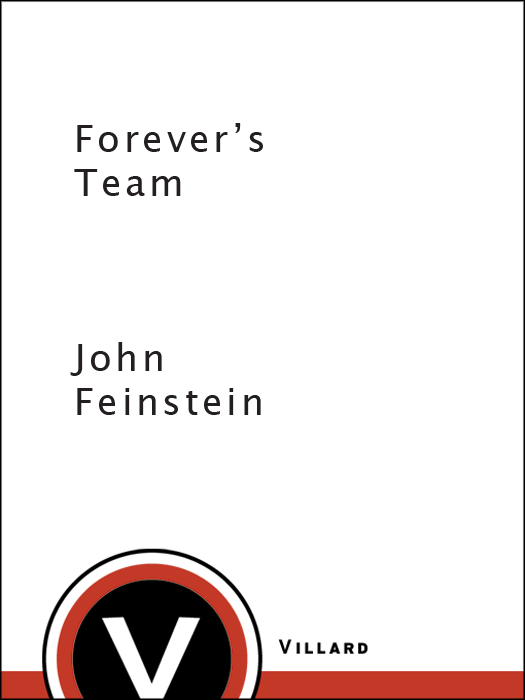
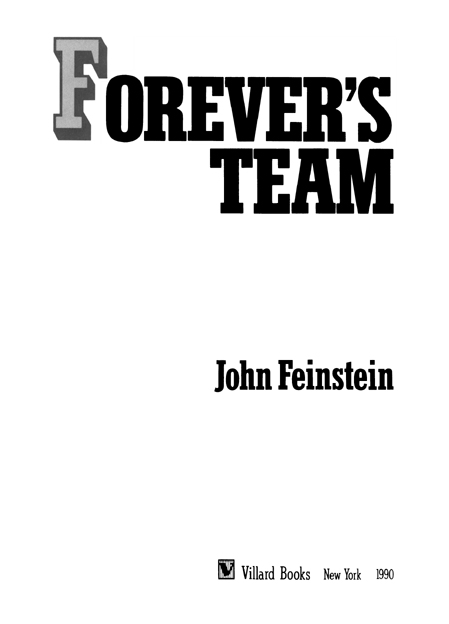
Copyright 1989 by John Feinstein
All rights reserved under International and Pan-American Copyright Conventions. Published in the United States by Villard Books, a division of Random House, Inc., New York, and simultaneously in Canada by Random House of Canada Limited, Toronto.
Library of Congress Cataloging-in-Publication Data
Feinstein, John.
Forevers team/by John Feinstein.
p. cm.
eISBN: 978-0-307-80092-3
1. Duke UniversityBasketballHistory. 2. Basketball playersUnited StatesBiography. I. Title.
GV885.43.D85F45 1990
796.3236309756563dc20
v3.1
Sunday morning, December 12, 1982, was a cold, clear morning in Washington, D.C., the kind that pumps energy into you when you step outside the door. I wanted an early start that day because I was working on a long story about the speaker of the Maryland House of Delegates.
I arrived in the newsroom of The Washington Post just before 10 A.M. early is a relative termand started to walk downstairs to the cafeteria for a cup of coffee. To do so, I had to walk through the sports department. I had left sports the previous January to pursue my fascination with politics but still wrote occasional pieces for the section.
Len Shapiro, the deputy sports editor, who runs sports on Sundays, stopped me by calling my name. There was an urgency in his voice, especially for a Sunday morning. I walked over to where he was sitting. Pointing to a story on his computer, he said, Have you heard about this yet?
I looked at the story. The first sentence was all I had to read: South Carolina basketball coach Bill Foster was listed in critical but stable condition early this morning after suffering an apparent heart attack last night following the Gamecocks upset victory over 15th-ranked Purdue.
By the time I finished the sentence my legs felt a little bit wobbly. It had been eight months since my father suffered a heart attack and I was familiar with the trauma that accompanied one. My dad had done everything right: He had started feeling sick at work and had gone straight to George Washington University Hospital, only a few blocks away. He actually had the attack in the hospital, which is one of the top heart treatment centers in the country. It had been a mild attack and he had been home within ten days.
Even so, the experience was frightening for everyone in my family. Now, looking over Shapiros shoulder, I searched the story for details. How serious was the attack? How much danger was Foster in? I knew from experience that the first twenty-four hours would be critical. I also wondered if he would ever coach again.
The story I was supposed to write that day was quickly forgotten. So was the coffee. Bill Foster had been the basketball coach at Duke when I was a student there. I had been sports editor of the student paper and had watched from close up as he went through the agonizing process of trying to rebuild a fallen program. Dukes record in Atlantic Coast Conference play during my four years as an undergraduate was 1149. I saw every loss, many of them torturous. But I also saw improvement as Foster brought players like Jim Spanarkel and Mike Gminski into the program. During my senior year came the epic recruitment of Gene Banks.
And then came 1978. From last place in the ACC in 1977, Duke wrote one of the more remarkable Cinderella stories in college basketball history. With Banks and Kenny Dennard, both freshmen, starting at the forward spots, Duke won the ACC Tournament, won the East Regional of the NCAA Tournament, and then shocked Notre Dame in the national semifinals in St. Louis. The dream ended in the final, a 9488 loss to Kentucky, but that didnt diminish the achievement.
Duke was Americas Team before the term had become popular. The players were brash, funny, and articulate. Unlike Kentuckys players, who had to win or be labeled failures, they were kids having fun. They were playing a game. There was none of that basketball is religion garbage that has created so much sickness around the Kentucky program. They lost the game but won the country.
To me, less than a year out of Duke, the experience was extraordinary. I had known the players not as a reporter but as fellow students. Fosters three assistant coaches were all young enough to be friends and Foster himself was the kind of person who was impossible not to like. He had a self-deprecating sense of humor though he was driven and intense about rebuilding. He also had time to talk to a student reporter, win or lose, day or nightoften late at night. That alone made him unusual.
My most vivid memory of St. Louis came after the Kentucky game, when the Duke players and coaches came back onto the court to receive their awards. Their arms were linked, their message apparent: you can beat us but you cant break us. As they walked onto the court, the Duke fans spotted them and immediately began chanting, Well be back, well be back. It was so loud that it drowned out the celebration of the Kentucky fans. I stood there, tingling, thinking, Damn right theyll be back.
And why not? The only senior was Bruce Bell, who had come to Duke as a walk-on. Bell was a great guy but a limited player. The fact was, the first ten players would be back. This was clearly only the beginning.
Only it didnt turn out that way. The pressure of expectations, inability to deal with sudden success, changes in the coaching staff, injuries and immaturity kept them from coming back. Duke had excellent teams the next two years: 228 in 79 and 249 with another ACC title and a trip to the final eight in 80. But the magic was gone. It was replaced by frustrations that eventually drove Foster to flee in pursuit of happiness at South Carolina.
Fosters departure devastated me. I thought it was a mistake for him and for Duke. I was half right. Mike Krzyzewski succeeded Foster and has done a superb job. Back then, though, to the old student reporter, Foster was Duke basketball.
I kept in touch with him after he went to South Carolina and with the assistantsnow scatteredas well as a lot of the players. I had talked to Foster a couple of weeks earlier, just before the 8283 season began, and he had been optimistic about his third team at South Carolina.
Were actually not bad, he had said, which from him was rampant praise. You ought to come down when we play Clemson. Stay at the house if you want, weve got loads of room.
And now, on the night of a major victory, a heart attack. I walked to my desk and dialed Fosters home number. No answer. I called Lou Goetz next. If anyone was likely to have news about Foster it was Goetz, who had spent fourteen years with him as a player and assistant coach.
Im about to drive down there, said Goetz, who had quit coaching the previous year and moved back to Durham. I spoke to the hospital and they said he isnt in any danger. But I want to see him.
That made sense. In a lot of ways Goetz was the son Foster (who has four daughters) had never had. Goetz said he would call me if he had any news.
I then called Tom Mickle, who had been the sports information director when I was at Duke. He was now promotions director and had been as close to Foster as almost anyone. I needed to talk to people who had been there through the bad times and the good. Catharsis in crisis, I suppose.
Mickle and I talked at length about the inevitability of it all; Foster was so driven, so unable to take things easy, so torn up after every defeat. My God, Fein, Mickle said, it still seems like St. Louis was last week. How can it be almost five years?
Font size:
Interval:
Bookmark:
Similar books «Forevers Team»
Look at similar books to Forevers Team. We have selected literature similar in name and meaning in the hope of providing readers with more options to find new, interesting, not yet read works.
Discussion, reviews of the book Forevers Team and just readers' own opinions. Leave your comments, write what you think about the work, its meaning or the main characters. Specify what exactly you liked and what you didn't like, and why you think so.


